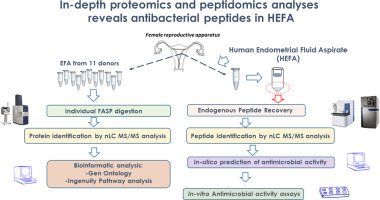当前位置:
X-MOL 学术
›
J. Proteomics
›
论文详情
Our official English website, www.x-mol.net, welcomes your
feedback! (Note: you will need to create a separate account there.)
In-depth proteomics and natural peptidomics analyses reveal antibacterial peptides in human endometrial fluid.
Journal of Proteomics ( IF 2.8 ) Pub Date : 2020-01-18 , DOI: 10.1016/j.jprot.2020.103652 Mikel Azkargorta 1 , Marta Bregón-Villahoz 2 , Iraide Escobes 1 , Jone Ibáñez-Pérez 3 , Ibon Iloro 1 , Maria Iglesias 3 , Miren Diez-Zapirain 3 , Aintzane Rabanal 3 , Begoña Prieto 3 , Maria-Dolores Moragues 2 , Roberto Matorras 3 , Felix Elortza 1
Journal of Proteomics ( IF 2.8 ) Pub Date : 2020-01-18 , DOI: 10.1016/j.jprot.2020.103652 Mikel Azkargorta 1 , Marta Bregón-Villahoz 2 , Iraide Escobes 1 , Jone Ibáñez-Pérez 3 , Ibon Iloro 1 , Maria Iglesias 3 , Miren Diez-Zapirain 3 , Aintzane Rabanal 3 , Begoña Prieto 3 , Maria-Dolores Moragues 2 , Roberto Matorras 3 , Felix Elortza 1
Affiliation

|
The composition of endometrial fluid reflects the status of the endometrium; it is a good atraumatic source of information on embryo implantation processes and possible pathological conditions. Although some attempts have been made to characterise its proteome, the catalogue of its proteins remains incomplete and little has been done to analyse the natural peptides it contains. Here, we present a comprehensive analysis of the proteins and natural peptides of the endometrial fluid. The protein content of samples from 11 individuals was analysed using the novel timsTOF Pro mass spectrometer. We identified 4694 proteins with at least one peptide with FDR < 1%, of which 2261 were found in >50% of the samples. A pooled endometrial fluid sample was used for isolation and analysis of the natural peptides. Mass spectrometry analysis identified 3899 naturally occurring peptides from 238 different proteins. Among these, there were some putative natural antibacterial peptides. Antimicrobial activity of peptides derived from elafin and Cu/Zn superoxide dismutase was confirmed using microbiological assays. Our results substantially expand the catalogue of known endometrial fluid proteins and provide extensive new information on the natural peptide content of this fluid. SIGNIFICANCE: The endometrial fluid contains many proteins whose clinical relevance is still unknown. Some might be merely markers of endometrial function, but others might play a role in embryo nutrition and/or implantation. Human endometrial fluid analysis might open the door to new developments in embryo transfer strategies in in-vitro fertilisation programmes and lead to improvements in the composition of embryo culture media. Here, we report, for the first time, antimicrobial activity of endometrial fluid peptides. Such peptides could play an important role in the balance of the recently described uterine microbiota.
中文翻译:

深入的蛋白质组学和天然肽组学分析揭示了人类子宫内膜液中的抗菌肽。
子宫内膜液的成分反映了子宫内膜的状态。它是有关胚胎着床过程和可能的病理状况的很好的无创伤信息来源。尽管已进行了一些尝试来表征其蛋白质组,但其蛋白质目录仍然不完整,并且几乎没有分析其所含的天然肽。在这里,我们对子宫内膜液的蛋白质和天然肽进行全面分析。使用新型timsTOF Pro质谱仪分析了11个个体的样品中的蛋白质含量。我们鉴定出4694种蛋白质,其中至少一种FDR <1%,其中> 50%的样品中发现2261种蛋白质。合并的子宫内膜液样品用于天然肽的分离和分析。质谱分析从238种不同蛋白质中鉴定出3899种天然肽。其中,有一些推定的天然抗菌肽。使用微生物测定法确认了衍生自弹性蛋白和铜/锌超氧化物歧化酶的肽的抗菌活性。我们的结果大大扩展了已知子宫内膜液蛋白的目录,并提供了有关该液中天然肽含量的广泛新信息。意义:子宫内膜液含有许多蛋白质,其临床相关性尚不清楚。一些可能只是子宫内膜功能的标志物,而另一些可能在胚胎营养和/或植入中起作用。人子宫内膜液分析可能会为体外受精计划中胚胎移植策略的新发展打开大门,并导致胚胎培养基组成的改善。在这里,我们首次报道了子宫内膜液肽的抗菌活性。这样的肽可能在最近描述的子宫菌群的平衡中起重要作用。
更新日期:2020-01-21
中文翻译:

深入的蛋白质组学和天然肽组学分析揭示了人类子宫内膜液中的抗菌肽。
子宫内膜液的成分反映了子宫内膜的状态。它是有关胚胎着床过程和可能的病理状况的很好的无创伤信息来源。尽管已进行了一些尝试来表征其蛋白质组,但其蛋白质目录仍然不完整,并且几乎没有分析其所含的天然肽。在这里,我们对子宫内膜液的蛋白质和天然肽进行全面分析。使用新型timsTOF Pro质谱仪分析了11个个体的样品中的蛋白质含量。我们鉴定出4694种蛋白质,其中至少一种FDR <1%,其中> 50%的样品中发现2261种蛋白质。合并的子宫内膜液样品用于天然肽的分离和分析。质谱分析从238种不同蛋白质中鉴定出3899种天然肽。其中,有一些推定的天然抗菌肽。使用微生物测定法确认了衍生自弹性蛋白和铜/锌超氧化物歧化酶的肽的抗菌活性。我们的结果大大扩展了已知子宫内膜液蛋白的目录,并提供了有关该液中天然肽含量的广泛新信息。意义:子宫内膜液含有许多蛋白质,其临床相关性尚不清楚。一些可能只是子宫内膜功能的标志物,而另一些可能在胚胎营养和/或植入中起作用。人子宫内膜液分析可能会为体外受精计划中胚胎移植策略的新发展打开大门,并导致胚胎培养基组成的改善。在这里,我们首次报道了子宫内膜液肽的抗菌活性。这样的肽可能在最近描述的子宫菌群的平衡中起重要作用。











































 京公网安备 11010802027423号
京公网安备 11010802027423号